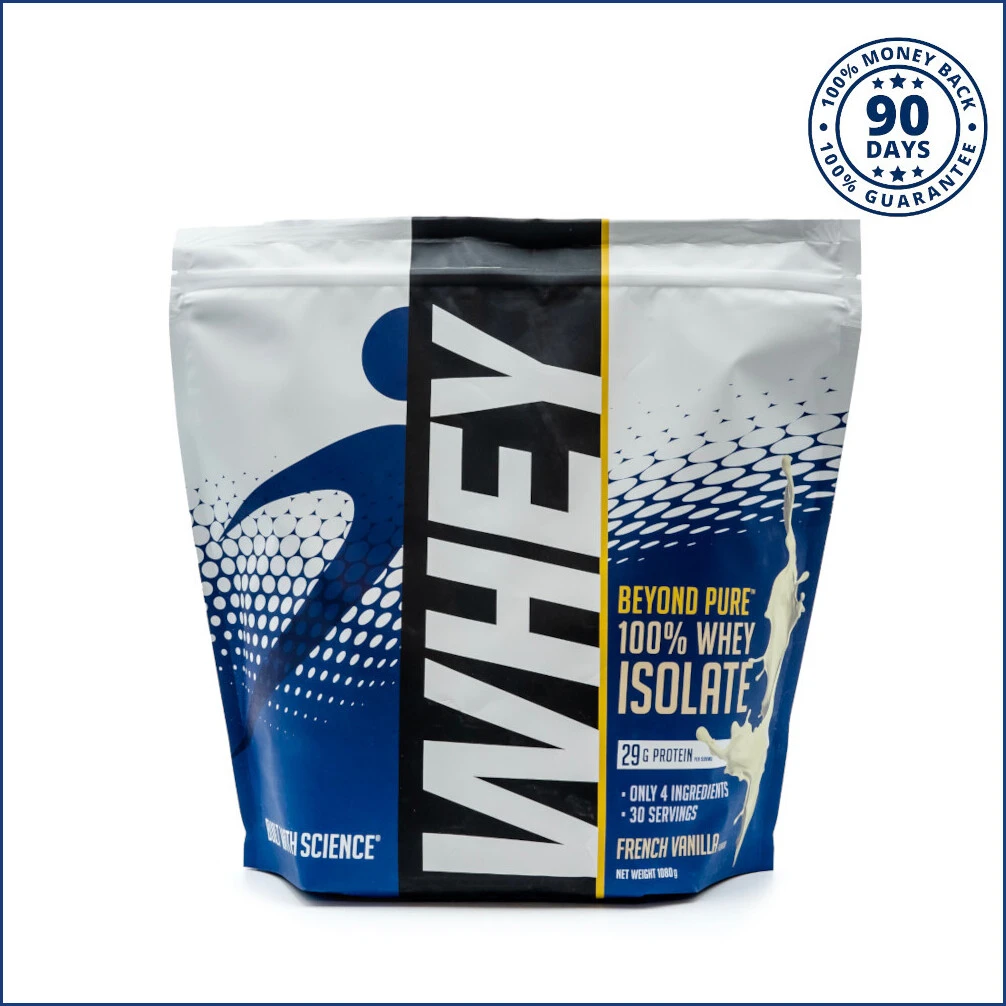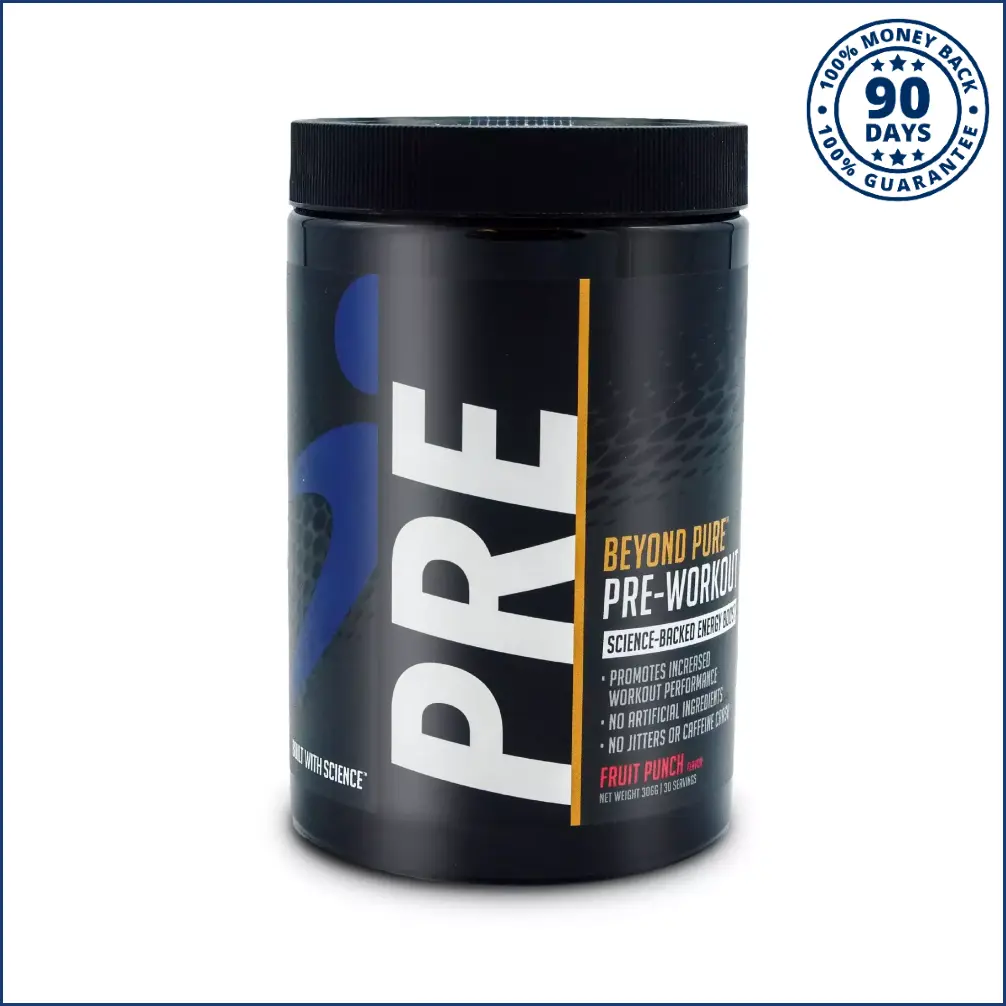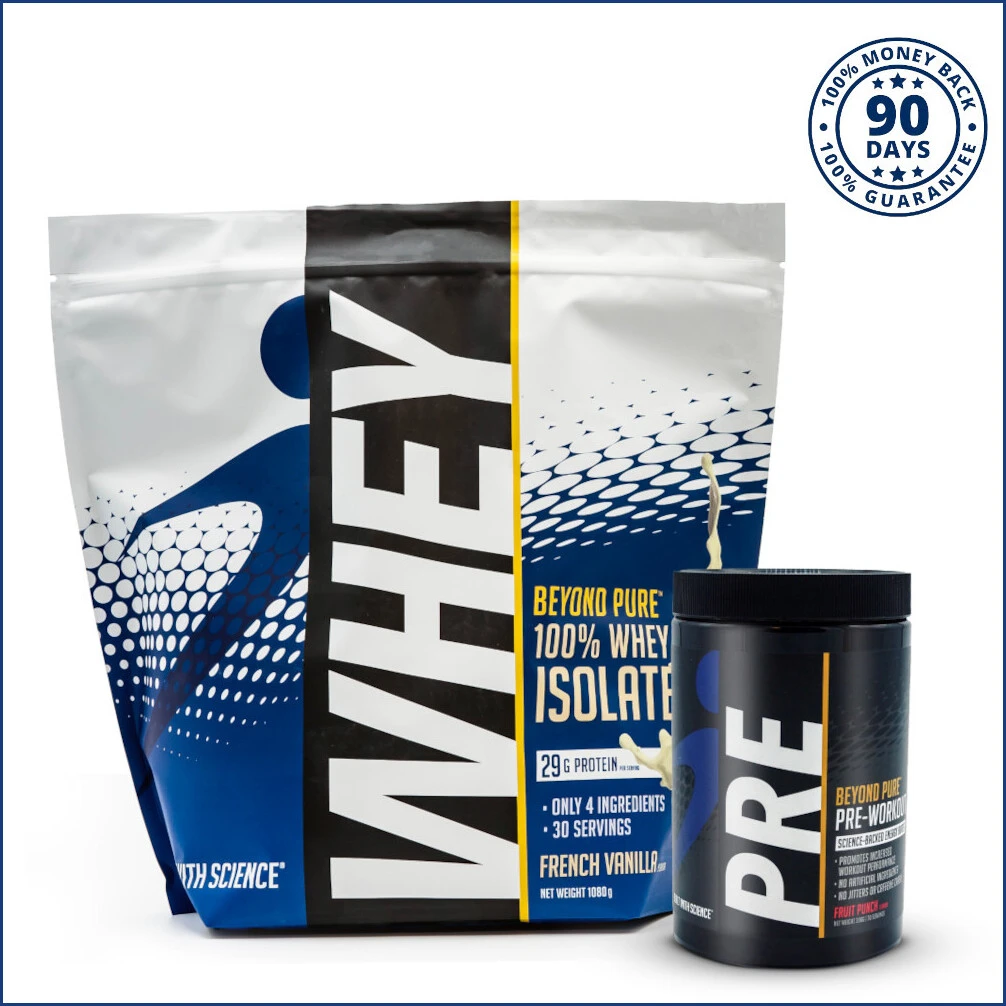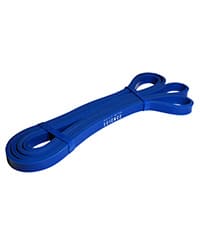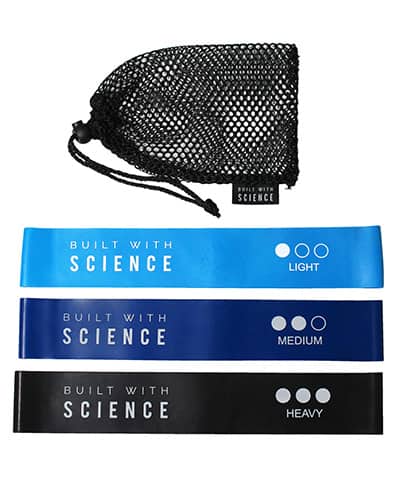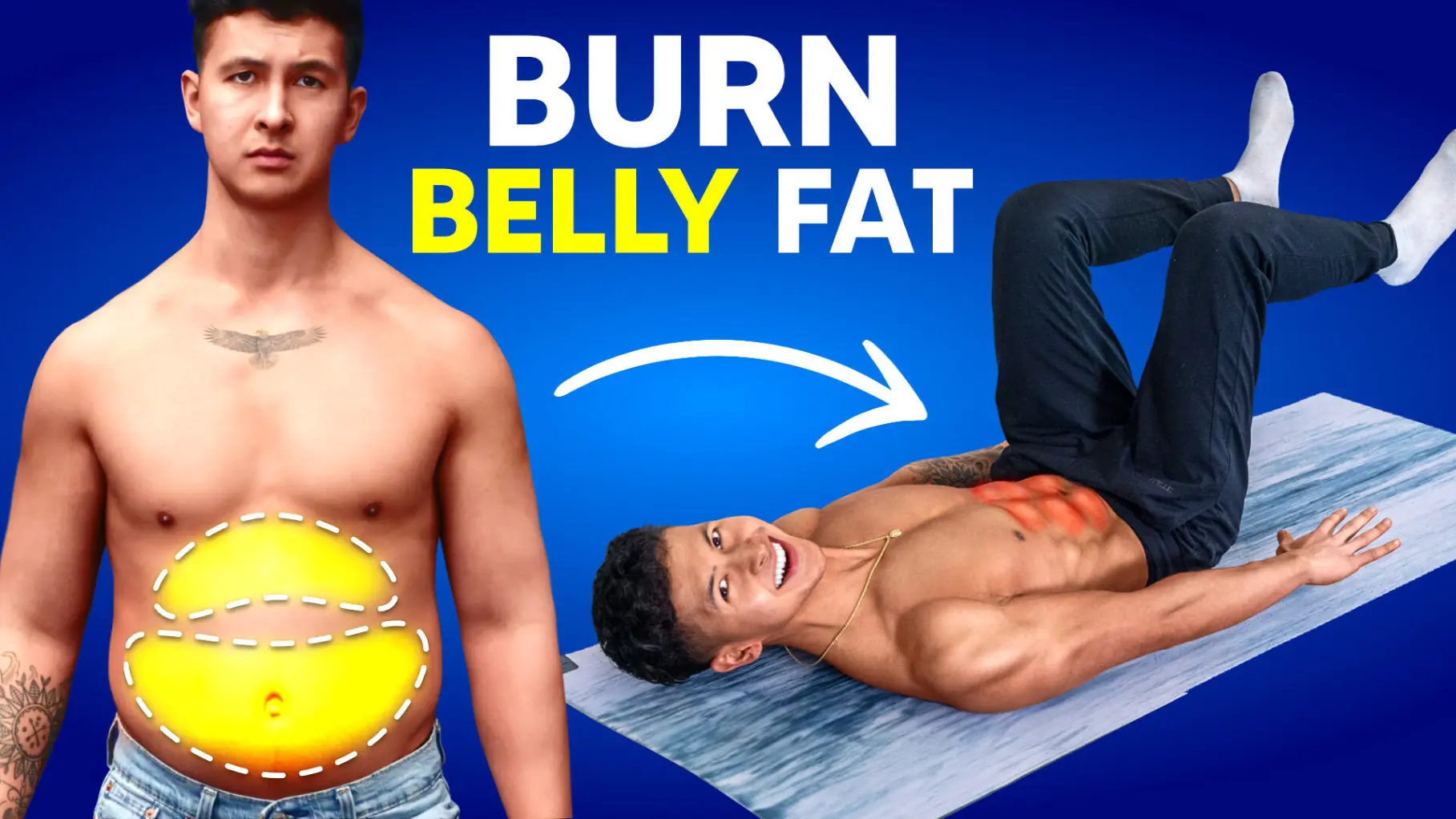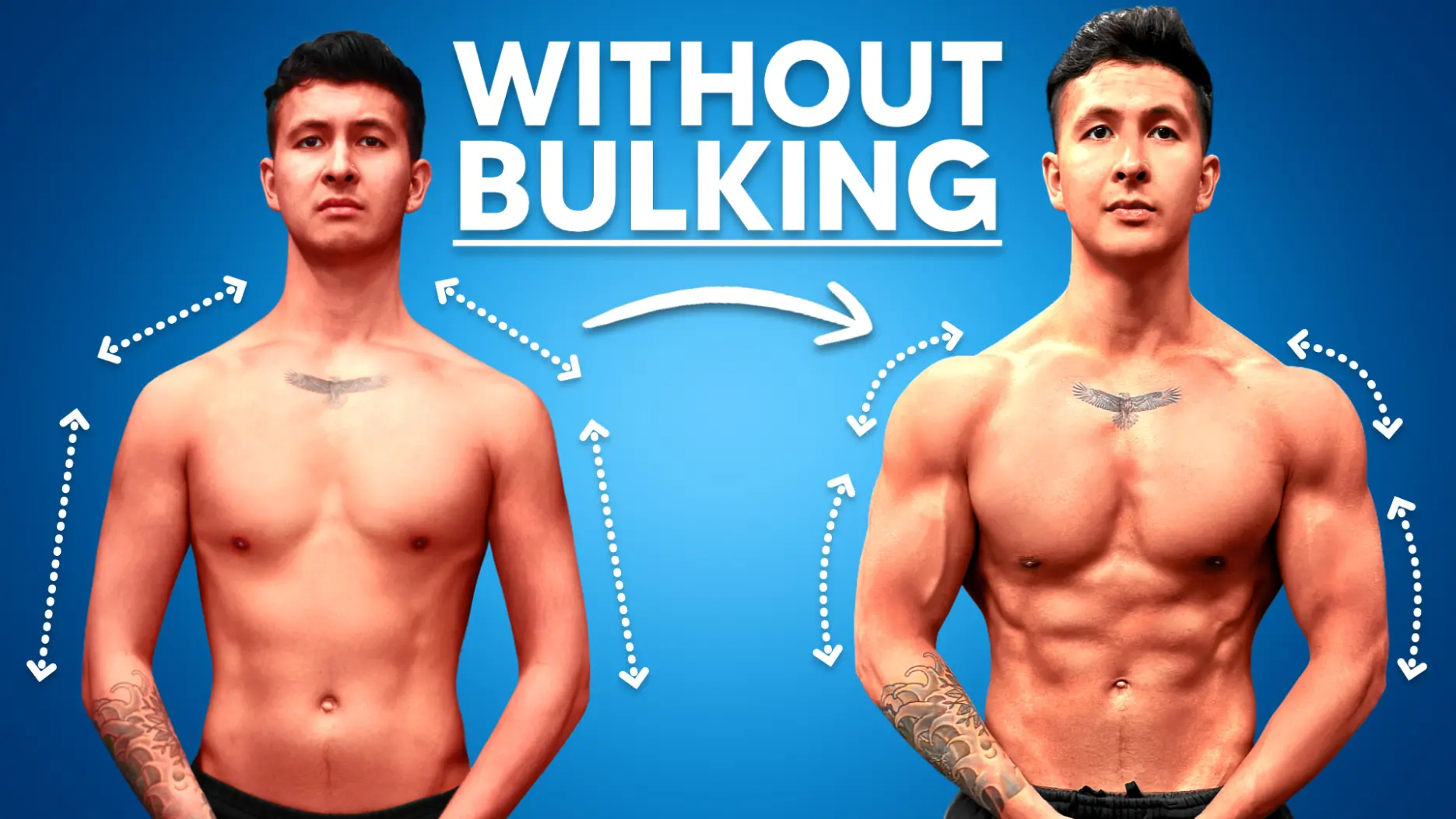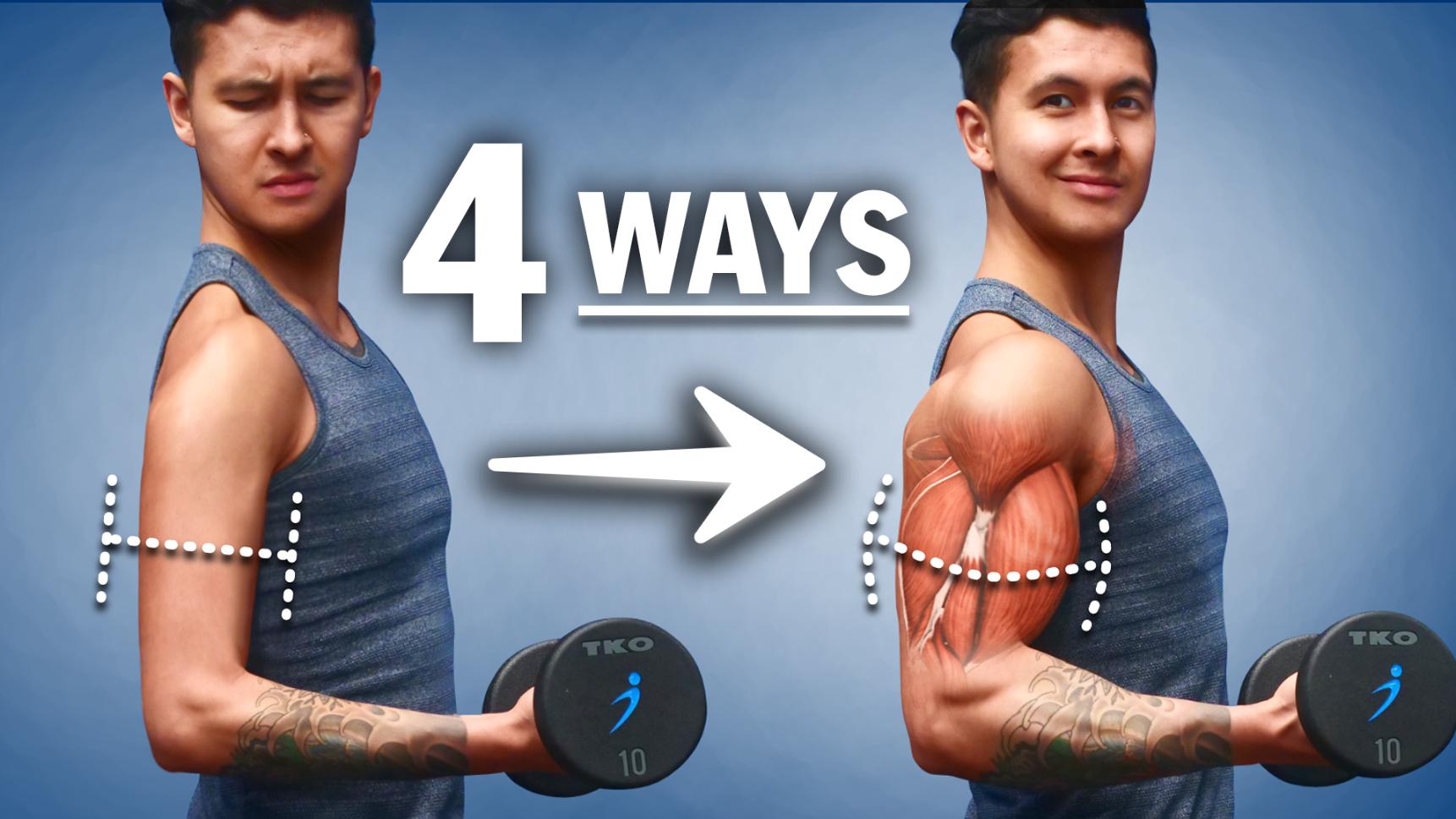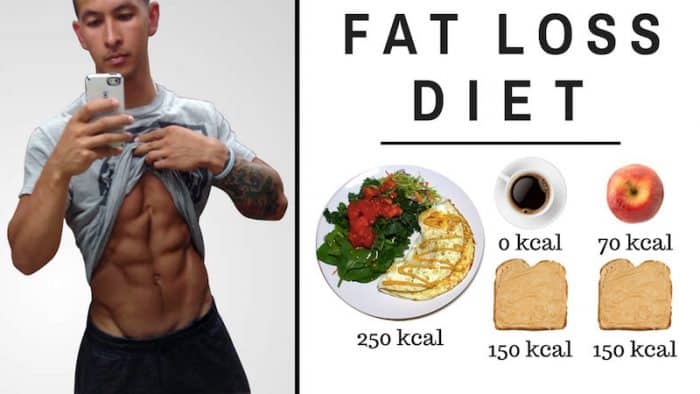
The BEST Science-Based Diet for Fat Loss (All Meals Shown!)
If you want to learn of the best evidence-based diet to lose fat, then you need to read this article.
When it comes to fat loss (or "cutting"), there’s no doubt that your diet is the most important factor you have to get right. Even if your training is on point and consistent, you’re simply not going to see the results you want without a proper nutrition strategy.
Yet this is where most people fail. And I honestly don’t blame them. We’re constantly overwhelmed with new "fat burning diets" that are supposedly the new best diet to lose weight. So it becomes extremely difficult to know which approach to take.
But the real truth is, every single diet (Check out this muscle building diet article) or dieting method out there works the exact same way. They ALL achieve fat loss by causing you to eat at a caloric deficit.
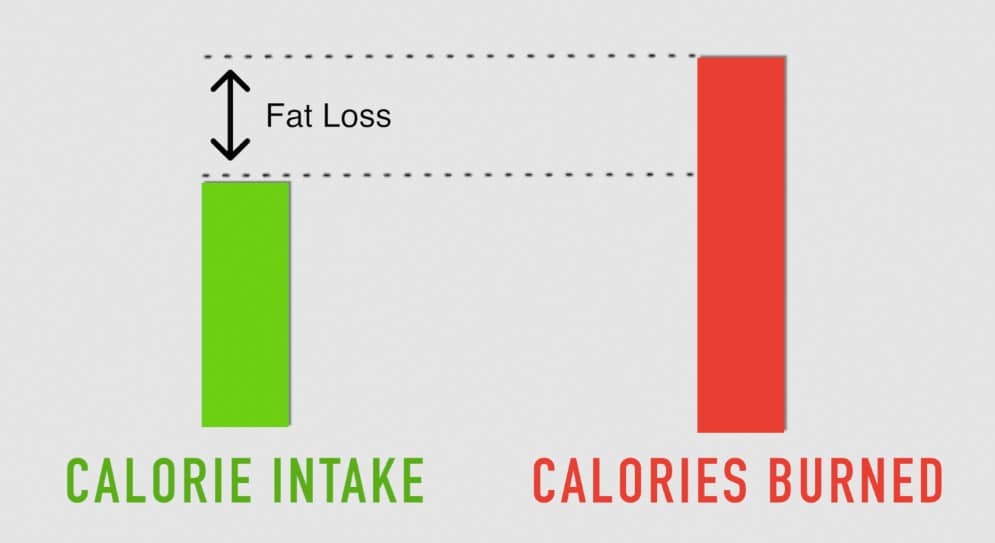
Meaning that you’re eating less calories than you’re burning everyday.
Research has time and time again proven this idea. That whether it’s keto, intermittent fasting, paleo, and so on, although these diets may each have certain psychological and physiological benefits - none of these diets or methods have any "special fat loss effect." They instead work by making it easier for you to eat less calories.
Thus, the best diet to lose fat is the one that you personally enjoy the most and will be consistent with. But.. there's a few things you have to get right within that diet if you want to see the best fat loss results.
Before that: if you're looking for a training program that'll always help you take care of the most important things for fat loss (and muscle growth), I've got just the thing for you. Every BWS program is designed to be an all-in-one, science-based process that’ll get you to your dream physique FAST. And best of all? It’s all rooted in science. For more information:
Click the button below to take my analysis quiz to discover the best program for you:
↓
How to Optimize Your Diet for Fat Loss
There are a few factors you need to get right in order to optimize to lose fat, and are mainly how much of the following you consume on a daily basis:
- Total Calories
- Protein
- Carbohydrates
- Fat
So how exactly do you optimize each of these factors for fat loss?
1. Calories
If you want to maximize fat loss while minimizing muscle loss, then you have to pay close attention to how many calories you’re intaking. And in this case, more is definitely NOT better.
Research indicates that a moderate calorie deficit that enables you to lose around 0.7% of your bodyweight per week (~1lb of weight loss per week for most people) is ideal. In fact, a more aggressive calorie deficit was shown to hinder fat loss as opposed to accelerate it. Although you may lose more weight with a larger deficit, we want to maximize FAT loss rather than WEIGHT loss. Focusing on the latter will just lead to a "skinny-fat" physique with little muscle definition.
And if you’re unaware of what your calorie intake should be, a good starting point and something recommended from a 2014 paper by Eric Helms and colleagues, is to simply "multiply your bodyweight (in lbs) by 13."
So for a 170lb individual, your daily calorie intake would be somewhere around 2210 calories per day (170 x 13 = 2210 calories).
Although this won’t be spot on for everyone, you can start with that and then increase or decrease your calories based on how your weight loss progresses throughout the next little while.
2. Protein
As for protein, it’s the most important macronutrient you want to keep track of. Research has repeatedly shown that it plays a major role in maintaining muscle while you’re in a calorie deficit.
And although how much protein you should intake will always be a highly debated topic, a recent 2018 meta-analysis from the Journal of Sports Medicine found that intaking at least 0.73g/lb of bodyweight is enough to maximize muscle growth and maintenance.
However, I personally find that intaking a little more than this (~1g/lb) is beneficial when restricting calories since we know that protein is the most satiating macronutrient, so it can better help keep you full throughout the day and it just acts as a buffer to help minimize any possible muscle loss.
3. Carbs + Fat
Now as for carbs and fats, despite the ongoing debate between low fat versus low carb diets, a recent 2018 year-long randomized clinical trial with over 600 subjects, found that:
When protein intake is equated, both low-fat and low-carb diets are equally as effective for fat loss.
So in reality, these two factors are of lesser importance than your total calories and your daily protein intake and can therefore be adjusted based on what kinds of foods you personally enjoy.
But generally, the literature recommends a fat intake of around 0.25-0.5g/lb of bodyweight from healthy fats and then the rest of your calories, minus your protein of course, coming from carbs.
Research does also suggest that females might do better sticking to the higher end of that fat range, so that’s something to keep in mind as well.
So as an example of how you could set up your diet factoring a, 170lb male would require:
Total Calories: 170lbs x 13 = ~2,210 calories per day
Protein: ~170g ( 170g x 4 = 680 calories since protein has 4 calories per gram)
Fats (using the middle of the recommended range): 170lb x 0.4 g/lb = 68g (68g x 9 = 612 calories since fat has 9 calories per gram)
Carb (whatever is left over): 2,210 calories - 680 calories protein - 612 calories fat = 918 calories of carbs (918 calories / 4 = 230g carbs since carbs has 4 calories per gram).
So, the individual above would need roughly 170g protein, 68g fat, and 230g carbs which totals to around 2,200 calories per day. Voila!
Now that you’ve learned the basics regarding setting up and optimizing your diet for fat loss, let’s take a look at what a typical day of eating at a calorie deficit looks like for me.
The Main Goals
So before we get started with the first meal, here are the main goals I try to achieve with my diet (which you should strive to achieve as well):
Goal 1: Hit my calorie and macronutrient goals.
This is what I previously discussed, and currently my main focus is to intake roughly 2,300 calories and around 165g of protein a day. The amount of fats and carbs I intake vary but are within the recommendations I previously went through.
Goal 2: Have fruits/veggies with every meal.
This simply helps keep me full since fruits and veggies are often low in calories, and they help me minimize any micronutrient or fibre deficiencies.
Goal 3: Space out protein throughout the day (ideally 4 meals).
is a good idea for optimizing daily protein intake, since as shown in Brad Scheonfeld’s 2018 study, in order to maximize muscle anabolism, your daily protein intake should ideally be spread across a minimum of four meals throughout the day.
Goal 4: Stick mostly to unprocessed foods while incorporating foods I personally enjoy.
This is vital for my overall well-being and adherence to the diet - which in fact will be the most important factor regarding your success with it!
So with that being said, let’s start with meal 1.
Meal 1: Breakfast/Pre-Workout (9:00 a.m.)
(450 calories: 30g protein, 67g carbs, 6g fat)
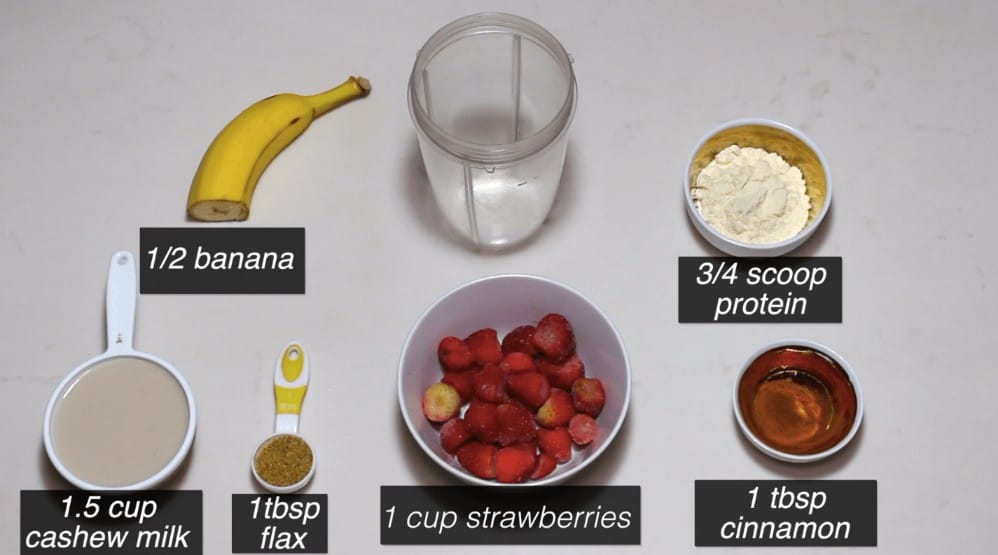
My breakfast usually consists of a smoothie with the following ingredients:
- Fruits and flaxseed for my micronutrients, fibre, and omega-3 (ALA) intake
- Cashew milk since it’s much lower in calories than dairy milk yet still provides calcium and vitamin D
- Whey isolate protein to contribute to my daily protein intake
- A few grams of cinnamon which helps add taste and has quite a bit of research supporting its ability to improve insulin sensitivity
With my smoothie I usually have rice cakes and the other half of the banana. I prefer this as my pre-workout meal since it consists of a fast digesting protein and high glycemic index carbs, which as explained in my pre-workout meal video, seems to be ideal for performance based on the literature.
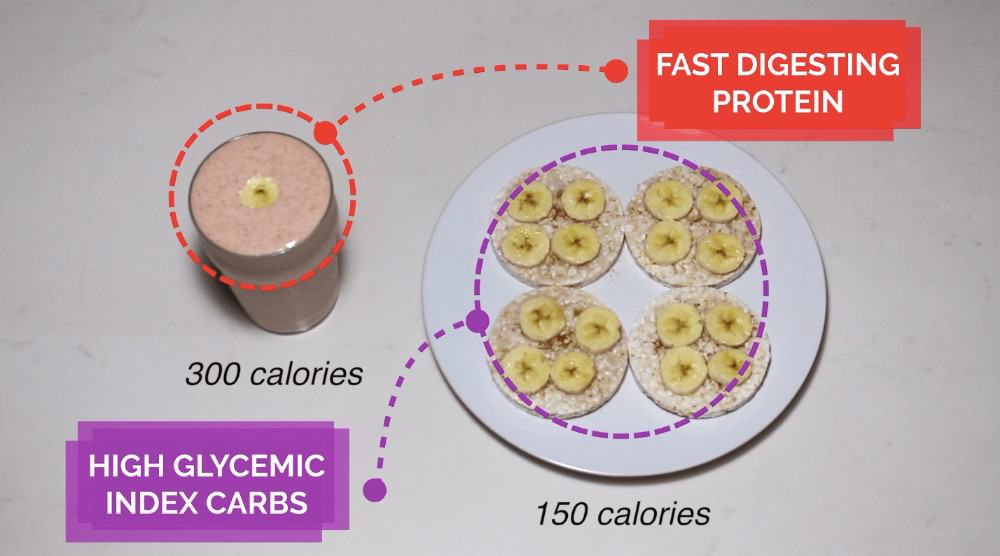
But in any case, getting in some form of carbs before your workout is something I’d highly recommend unless you’re fasting of course.
Meal 2: Lunch/Post-Workout (1:00 pm)
(500 calories: 42g protein, 80g carbs, 2g fat)
Now as for your post-workout meal, contrary to popular belief, and as shown in this 2013 literature review on the topic:
Consuming a meal immediately post-workout doesn’t seem to be very important if you’ve had a pre-workout meal with sufficient protein.
But since you want you do want to space out your protein intake, having another meal at least within a few hours after your workout would be recommended.
I personally prefer keeping it simple with ~12 oz baked (microwaved actually) sweet potato, 4oz baked chicken breast, and a large salad on the side with low calorie dressing.
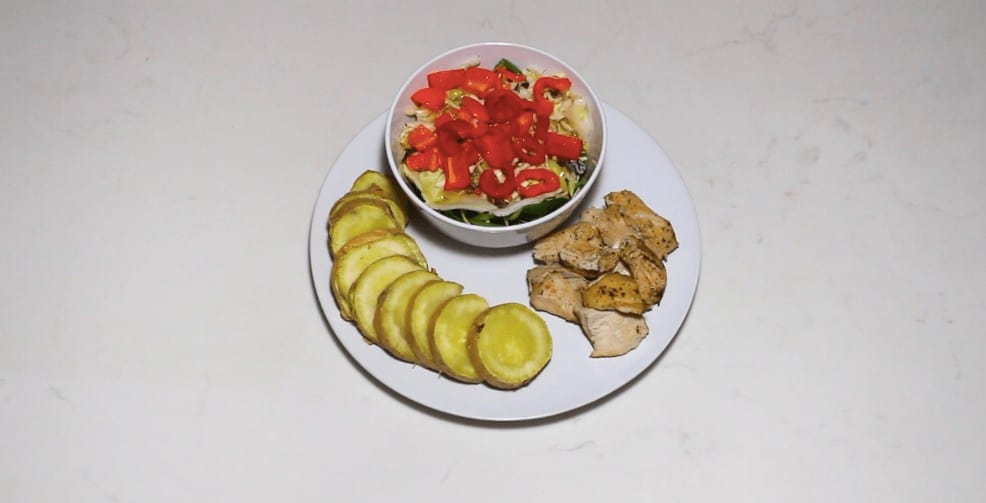
Again, simply sticking to unprocessed foods that help contribute to my overall micronutrient intake for the day.
Of course, you're not going to want to eat the same meal every single day - no matter how hard you wish to lose fat. Don't worry. Our 3-on-1 coaching program can help. You are going to have a dietitian who'll customize your meals (varied and delicious!) to suit your training goals. Plus, your coach and I will also be available to guide you every step of the way. If that sounds good to you, then:
Click the button below to find out more about the 3-on-1 coaching program:
↓
Mid-Day Snacks (1:00 pm to 6:00 pm)
(250 calories: 2g protein, 59g carbs, 0g fat)
Throughout the day I usually have a few more servings of various fruits and vegetables and a combination of black coffee and green tea. These are all quite low in calories yet help keep me full until my next meal.
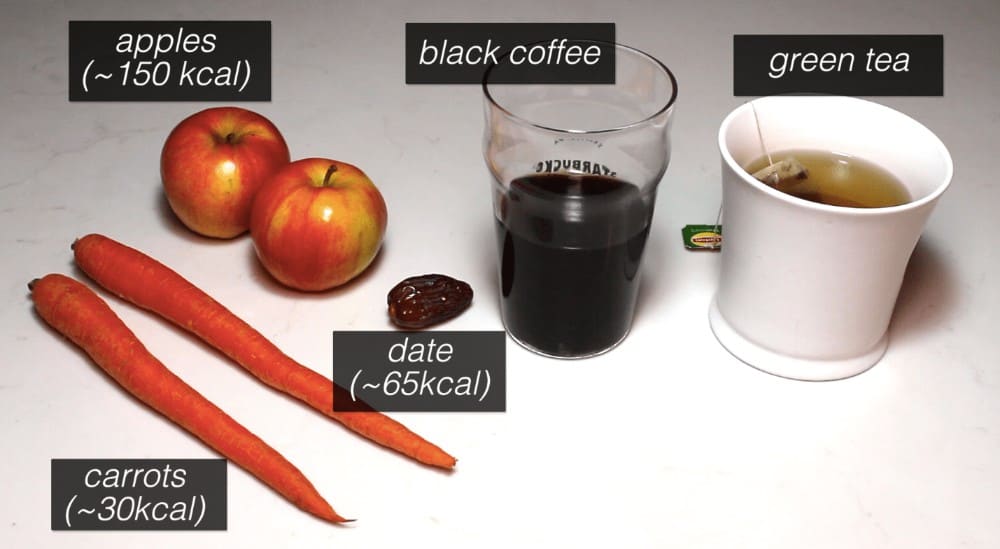
The caffeine in green tea and coffee is a natural appetite suppressant, and has been shown to increase your caloric expenditure. Research from the Journal of Clinical Nutrition suggests that a few cups of coffee can lead to an additional 80 or so more calories burned throughout the day - which is actually quite promising! Keep in mind that this effect will likely diminish as you gain caffeine tolerance. But, it’s still better than nothing.
This, and the fact that research shows that caffeine may also increase fat usage by the body makes it something I’d recommend incorporating in your diet if you enjoy it.
Meal 3: Dinner (6:00 PM)
(560 calories: 55g protein, 49g carbs, 16g fat)
Sushi is by far my favourite food so I tend to have it quite often. The great thing about knowing how much you should be eating is that you are able to fit in foods that you enjoy without it affecting your progress.
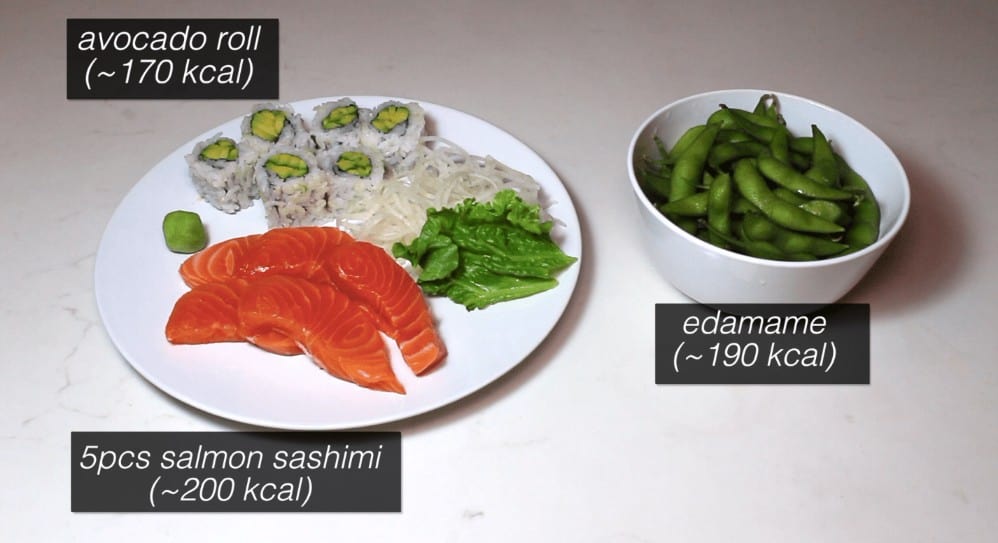
Now aside from being a relatively low calorie, high protein choice, the salmon helps provide the important omega-3 fatty acids DHA and EPA. These fatty acids have recently been shown in a 2018 literature review to possibly help with anabolic signalling and muscle repair and growth. So intaking a few servings of fish per week or supplementing with omega-3’s is something I’d highly recommend.
Meal 4: Late Night Meal (10:00 PM)
(560 calories: 42g protein, 34g carbs, 28g fat)
This is something I’ll typically have shortly before bed since I personally enjoy going to bed feeling full and it doesn’t impact my sleep. It’s usually a combination of eggs, egg whites, toast, peanut butter topped with stevia sweetener, and a salad with 0 calorie dressing.
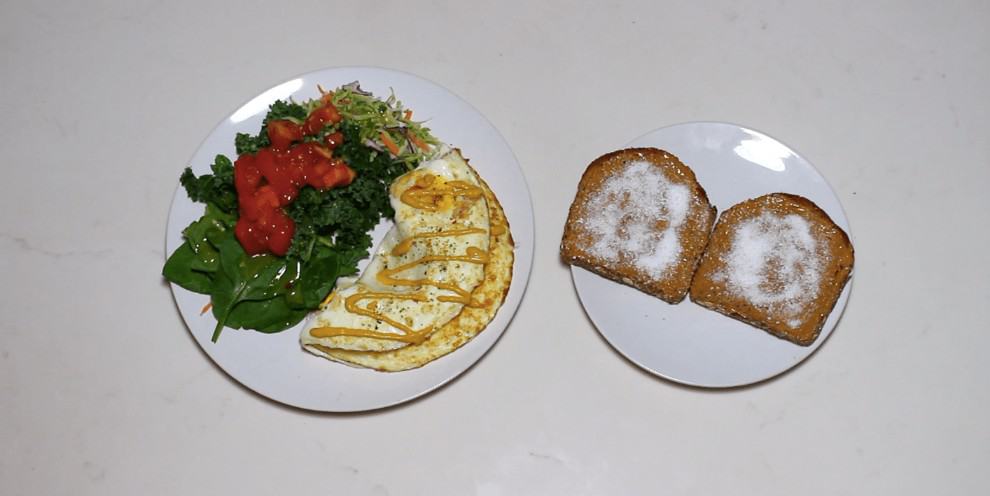
And for those against eating this late, the literature has shown time and time again that eating carbs or even food in general late at night will NOT contribute to fat gain given that you’re still staying at a calorie deficit.
Something I do want to mention though is that for very calorie-dense foods like peanut butter, I would highly recommend that you take the time and effort to at least measure or even better weigh out how much you’re using.
Several studies have shown that under-reporting calories is a very common reason why overweight individuals struggle to lose weight despite dieting. Which is probably because it’s so easy to do.
For example, here’s 300 calories worth of peanut butter compared to 100 calories – the difference is almost unnoticeable.
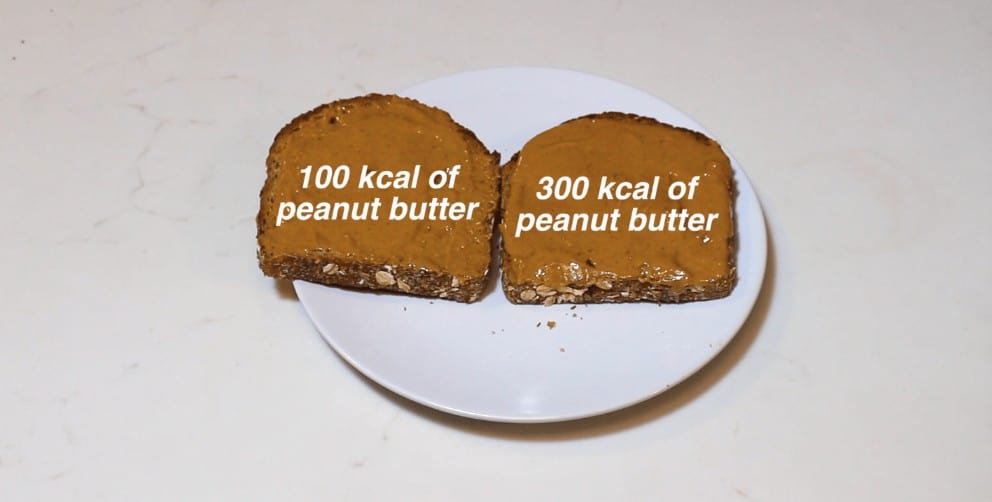
Yet this can easily be the factor that’s inhibiting your fat loss.
So if you have any measuring tools, use those, otherwise here's a link to a very affordable scale that I personally use myself.
Total Calories/Macros for the Day: 2,300 calories (171g protein, 277g carbs, 54g fat)
So that’s pretty much what a day of eating for fat loss looks like for me. Hopefully this provides you with some insight as to how to approach and optimize your diet for fat loss. The key is to incorporate foods you personally enjoy eating in order to create the diet that you can adhere to the best.
And for those looking for a complete step-by-step program that uses science to show you how to properly eat AND train week after week to transform your body in the most efficient and injury-free way possible, then:
Click the button below to take my analysis quiz to discover the best program for you:
↓
By the way, here’s the article summed up into a YouTube video:
That's it for this article. Let me know in the comments if you have any questions/concerns I can help you with. Don't forget to show me your support by giving me a follow on Instagram , Facebook , and Youtube where I’ll be posting informative content on a more regular basis. Cheers!

